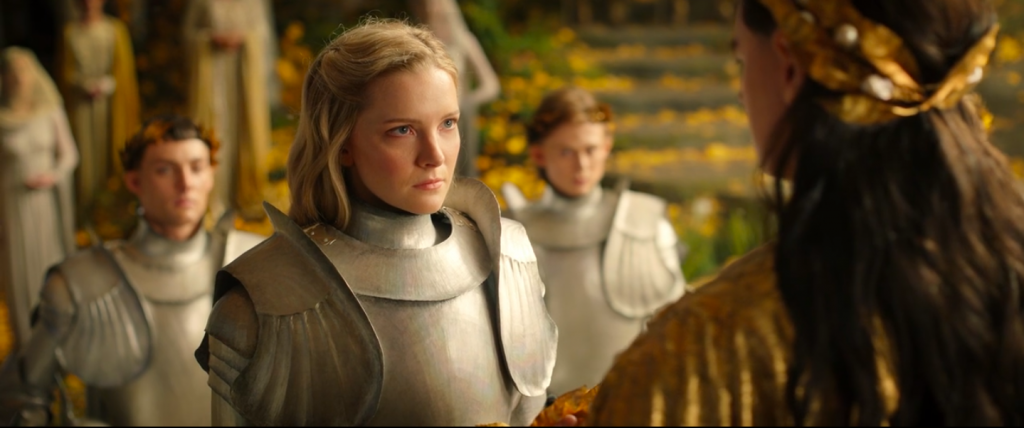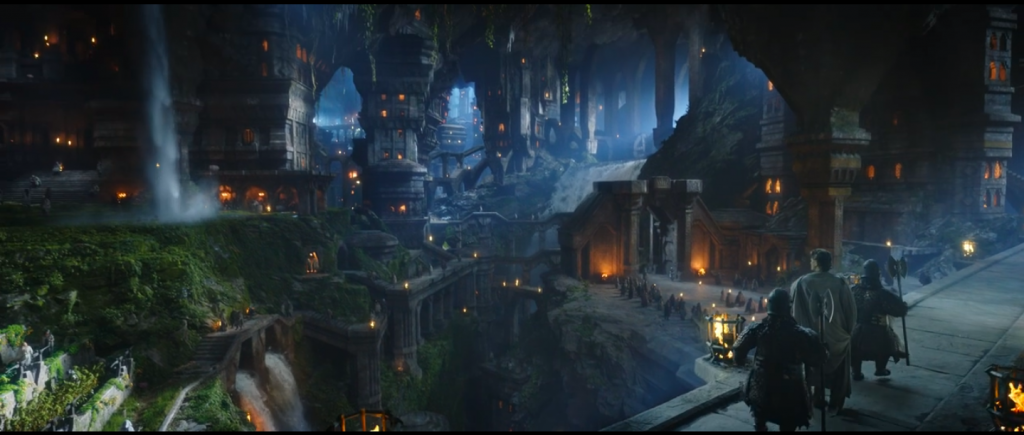Warning: Minor Spoilers Ahead!
On September 1st, Amazon finally dropped the first two episodes of one of television’s most expensive gambles yet: The Lord of The Rings: Rings of Power, a five-season long show based on J.R.R. Tolkien’s writings about the Second Age. Whether you were dreading or eagerly anticipating this day (or a complex combination of the two), you would be hard-pressed to find a more significant fantasy release in recent years. Amazon’s controversial adaptation has left many fans doubtful, but still, it felt only right to give the series a chance — if only for the possibility of feeling like we’ve finally returned to Middle-Earth after nearly a decade since Jackson’s Hobbit movies. Two episodes in, it’s safe to say that Rings of Power has not achieved this in the slightest.
The first episode, “A Shadow from the Past,” begins with a prologue voiced by Galadriel (Morfydd Clark) that offers a glimpse into her childhood in the Blessed Realm of Valinor. After bullies destroy her paper boat— a nice reference to Galadriel’s Teleri heritage— she is consoled by her beloved older brother, Finrod Felagund (Will Fletcher). A scene that would have otherwise touched me instead left me flabbergasted as I tried to make sense of Finrod’s decidedly modern undercut. After a quick —if slightly curtailed— summary of the events leading up to Morgoth’s eventual defeat, a grown Galadriel is now hellbent on avenging her fallen brother. However, her mission does not sit well with the rest of her kinsmen, in particular the High King of Lindon Gil-galad (Benjamin Walker) and her friend Elrond (Robert Aramayo), who believe their enemy has been defeated and they must embrace a new age of peace.

possibly the most ugly Elven armour in any Tolkien onscreen adaptation. @Amazon Prime Video
The showrunners have not humanized the Elves so much as they have succeeded in making them terribly boring. There are countless elements to pick apart: the seemingly complete erasure of Galadriel’s husband and child, the downright lazy costuming, the distractingly inaccurate haircuts, etc. All of these missteps are blatant, clumsy, and represent a deliberate ignorance of Tolkien’s original writings and aesthetics. Nearly every scene pertaining to the Elves feature elements that feel laughably amateurish and take me completely out of the narrative. This is unfortunate considering the skill of many of the actors portraying these characters, Clark and Aramayo being chief among them, who manage to make the oftentimes lackluster dialogue remarkably passable.
The episodes also introduce a number of original characters. In the Southlands, a Silvan Elf Arondir (Ismael Cruz Córdova) seeks to discover the cause of a mysterious evil plaguing the hometown of his human lover Bronwyn (Nazanin Boniadi) — a relationship which has so far not even marginally been given its due. Meanwhile, The Harfoots of Rhovanion bring a refreshing levity to the series’ mostly dour tone. Though their scenes are mostly inoffensive, I’d like them to start taking on a bit more substance in coming episodes. This is likely to happen as the simple, nomadic lives of these proto-hobbits become threatened by the arrival of a mysterious Stranger (Daniel Weyman) who falls from the skies and is found and cared for by the curious Nori Brandyfoot (Markella Kavenagh).

The regretfully few scenes of the Dwarves of Khazad-dûm are the highlight of the episodes. I found myself gawking alongside Elrond at the sight of the Dwarven city at the height of its power, while also admiring how distinct it felt from the other Dwarven kingdoms we had been introduced to in the Jackson movies. Khazad-dûm is a bustling city filled with light and nature and cascades of water: it is a whole world of its own. Prince Durin (Owain Arthur) and Princess Disa (Sophia Nomvete) are portrayed magnificently; the pair have wonderful chemistry and feel like a real, loving couple. Durin and Elrond’s complicated friendship likewise felt authentic considering the fraught history of their respective peoples; seeing them reach a begrudging reconciliation by the end of the episode made for a lovely emotional beat.
Although things are picking up, the show still tentatively remains in its expository stages— we’ve not yet had a chance to get acquainted with the Númenóreans at all, who will become crucial to the events of following episodes. On the whole, while undeniably epic in its scope and not without some shining moments, the show so far feels sharply distinct from any other Tolkien adaptation. In fact, many times it doesn’t feel like it’s trying to be an adaptation at all. Rather, this is a co-option. We aren’t back in Middle-Earth, only in Amazon’s distorted version of a Middle-Earth-like fantasy setting. Rings of Power has made it demonstrably clear that it doesn’t care about being faithful to Tolkien’s writings, so all it has to do is prove itself to be actually worthwhile. Bring on the next episode.
Feel free to let us know your thoughts on the first episodes of Rings of Power! Look out for weekly coverage of upcoming episodes.
